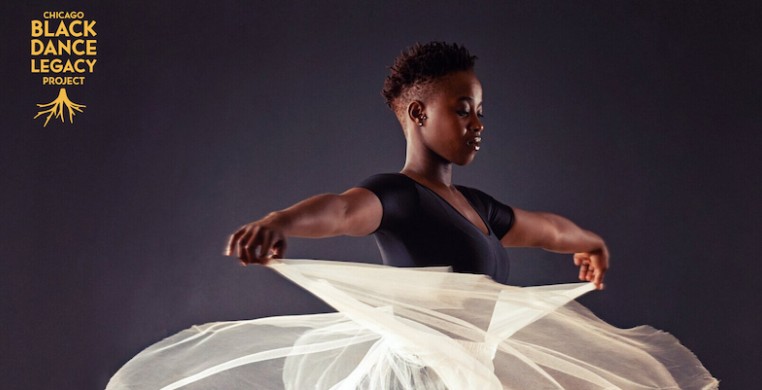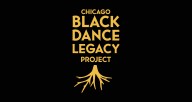UPDATE: The new seechicagodance.com will launch March 31st. Click here to learn more.
Legacy Project companies lean on each other to preserve and advocate for Black dance in Chicago
The Chicago Black Dance Legacy Project is taking action to combat the discrepancy between sustainable funding and the systematic underserving of dance in Chicago, particularly for Black dance forms and artists. There are currently eight member organizations that make up the CBDLP collective: Ayodele Drum & Dance, Chicago Multiculural Dance Company, Deeply Rooted Dance Theater, Forward Momentum Chicago, Joel Hall Dancers & Center, Muntu Dance Theatre of Chicago, Najwa Dance Corp and Red Clay Dance Company. Each of these member organizations is unique and requires different means of support, making the CBDLP’s goal to “bolster connections between participating organizations through collaborative programming” a staggeringly comprehensive one.
The strategies that the CBDLP employ are initially based on an assessment done by the Community Programs Accelerator, an initiative of the University of Chicago's Office of Civic Engagement that helps develop and strengthen community-based organizations by providing them with technical assistance and access to the university’s resources. By partnering with the Joyce Foundation, the CBDLP has received $396,600 in grants to aid member organizations with support for marketing, all-inclusive dance training programs, organizational development and general operating costs. The CBDLP has also partnered with the Reva and David Logan Center for the Arts, which provides members with state-of-the-art rehearsal and performance space.
While funding and venue-access are both especially important aspects of creating great dance works, attention must be paid to the CBDLP’s efforts to bring together and strengthen communication between Chicago’s Black non-profit dance entities. Mashaune Hardy, business manager for Ayodele Drum & Dance, agrees with the CBDLP’s collective-strength approach to building up Chicago’s Black dance community. “Each company has a unique identity and focus and they bring their artistic and business insights to the shared table,” she said in an interview. “We're able to advocate for more combined than separately. Sharing audiences, services and conversation has exposed us to more opportunities such [as] partnerships and media representation. I see the CBDLP as a facilitator of Black dance through assisting companies in strengthening their foundations to allow their art to thrive.”
In 2019, a comprehensive report titled “Mapping the Dance Landscape in Chicagoland” was published by See Chicago Dance with data resource providers Candid and Sustain Arts and arts-business consultant Fractured Atlas. The report—which accumulated and organized data from a large number and variety of sources both local and national—painted the most detailed picture yet of the who-what-where regarding dance funding in Chicago. What was discovered is that dance is more present in Chicagoland than ever before, with a steady increase in philanthropic funding for dance organizations and an increase in dancemakers and the number of dance studios and schools. However, for all this increase it turns out that the top three recipients of support received a whopping 56% of the total funding. Only 9% of funding was directed towards communities of color. Given that people of color make up over half of Chicago’s population, the inequity in these figures is stark and apparent. Other findings in the report found that the non-profit dance sector in Chicago is mainly comprised of small organizations. More than half had budgets below $50,000; nearly two-thirds had budgets below $100,000. These figures are disproportionately lower than that of the average budget for non-profits nationwide.
Essentially, half of the funding is going to three dance organizations—two of which reside and operate downtown or close to it—with the rest going to the other 93%. In that 93%, half of the artists and organizations eligible are already being funded below the national average and are unduly excluded from the majority of potential funding.
When the CBDLP mentions building sustainability for these organizations, a lot of what that means is building a strong company infrastructure through a lot of planning and office work—trudging, soul-sucking office work. An organization that gets one-quarter of a million dollars to hire people to handle all the administrative duties has ample time to make magic in the studio. But for most dancemakers the hours put into menial office-work and crash-course business learning is grueling and leaves little time for the thing they are doing it for: making dances.
Jacqueline Sinclair, artistic director of the Joel Hall Dancers & Center, had this to say about the CBDLP’s mission of preserving the legacies of Black dance in Chicago:
“The Chicago Black Dance Legacy Project has provided Joel Hall Dancers & Center the opportunity to highlight jazz dance as Black dance. Joel Hall has been an innovator of jazz and has created his own specific style, which we call Joel Hall Urban Jazz. His artistry is based on his experiences as a Black gay man growing up in Chicago. He has absorbed the energy of these influences and translated them onto the marley. This is not a trend but a lifetime of expression. The collective healing through projects like the CBDLP have a farther-reaching impact than when we work in segregation. We are not meant to be separate. We are social and communal. Jazz dance came from conversation.”
After a pause in activity, the post-COVID Chicago dance scene has an opportunity to level the inequality in the dance field. When we speak about rising tides, we are talking about adding more water. What are we going to do with a higher tide? Float bigger ships? And then when the tide eventually ebbs again—because that’s how tides work—we’re stuck with a couple giant ships ready to capsize and struggling to stay afloat. The ship we need in this moment is the stewardship of organizations like the CBDLP, whose mission to “address the historic inequities in arts funding by providing critical financial and operational support to local Black dance makers” has already made prolific waves in the dance community.
--
In March, The CBDLP will host a masterclass (3/12) and online conversation (3/5) with Ayodele Drum & Dance. Both events are free with registration. For more information or to register, visit the event links below.


